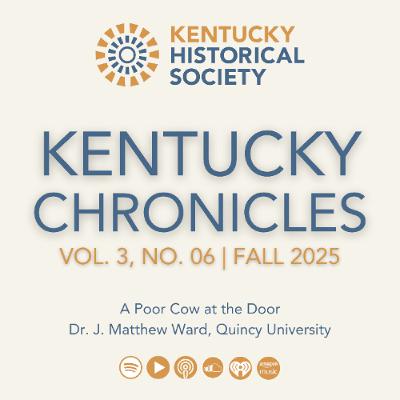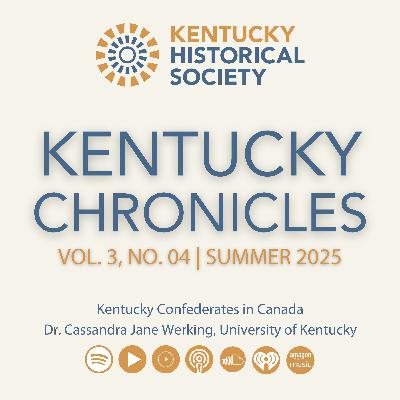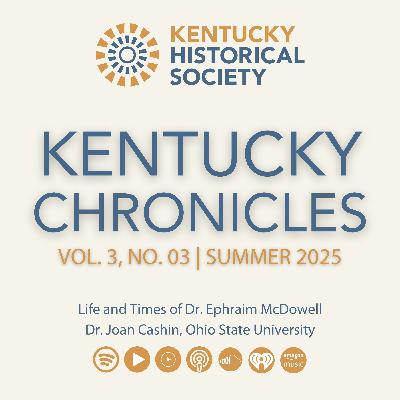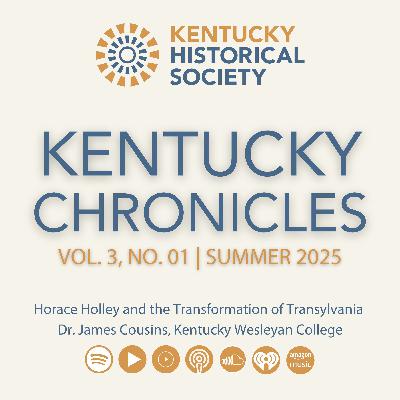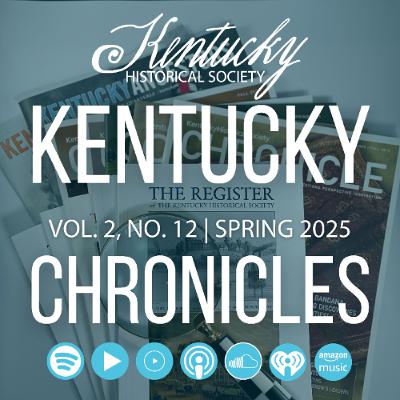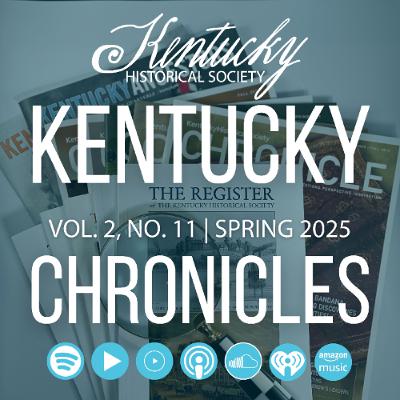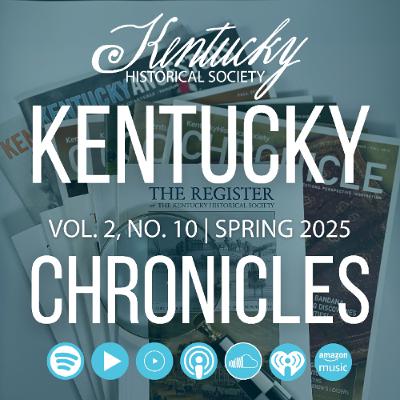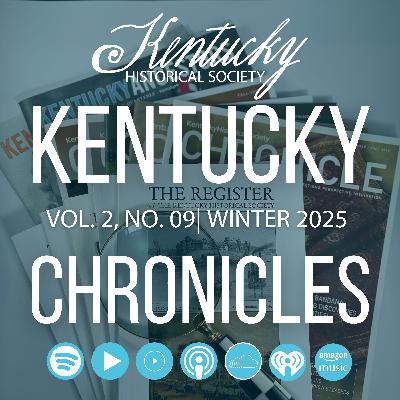Discover Kentucky Chronicles: A Podcast of the Kentucky Historical Society
Kentucky Chronicles: A Podcast of the Kentucky Historical Society

186 Episodes
Reverse
Nancy Hanks Lincoln, the mother of future President Lincoln, died from milk sickness in Spencer County, Indiana, in 1818, when young Abraham was only nine years old. Nancy died only days after providing care to other family members who had also succumbed to the illness. The Lincoln family’s experiences with milk sickness mirrored the challenges of thousands of other settlers who crossed the Appalachian Mountains seeking land and economic opportunity. Join us today for a discussion with a former KHS research fellow, who will discuss the medical, environmental, and social implications of milk sickness in antebellum America.
Dr. J. Matthew Ward is an assistant professor of history at Quincy University in Quincy, Illinois. He holds a PhD from Louisiana State University and is the author of Garden of Ruins: Occupied Louisiana in the Civil War, published in 2024 and available from LSU Press. Additionally, he serves on the board of the Quincy & Adams County Historical Society, as well as the Lincoln-Douglas Debate Museum.
Hosted by Dr. Allen A. Fletcher, associate editor of The Register of the Kentucky Historical Society and coordinator of our Research Fellows program, which brings in researchers from across the world to conduct research in the rich archival holdings of the Kentucky Historical Society.
history.ky.gov/khs-for-me/for-re…earch-fellowships
Kentucky Chronicles is presented by the Kentucky Historical Society, with support from the Kentucky Historical Society Foundation.
history.ky.gov/about/khs-foundation
This episode was recorded and produced by Gregory Hardison, with support and guidance from Dr. Stephanie Lang. Our theme music, “Modern Documentary,” was created by Mood Mode and is used courtesy of Pixabay.
To learn more about our publication of The Register of the Kentucky Historical Society, or to learn more about our Research Fellows program, please visit our website:
history.ky.gov/
history.ky.gov/khs-podcasts
November 2025 marks 200 years since the founding of Choctaw Academy, the first boarding school for Native Americans in the United States. Located in Great Crossings in Scott County, Choctaw Academy educated more than 600 students from across 17 nations. The academy, however, was more than a boarding school. It was a place where larger debates over imperialism, slavery, and Native American policy played out. Join us today for a discussion with Dr. Christina Snyder, author of the 2017 book Great Crossings: Indians, Settlers, and Slaves in the Age of Jackson.
Dr. Christina Snyder is the McCabe-Greer Professor of History at The Pennsylvania State University. Snyder earned her Ph.D. in History from the University of North Carolina at Chapel Hill. Snyder is the author of Great Crossings: Indians, Settlers, and Slaves in the Age of Jackson and Slavery in Indian Country: The Changing Face of Captivity in Early America. These books received a wide range of accolades, including the Francis Parkman Prize, the John H. Dunning Prize, the James H. Broussard Prize, and the John C. Ewers Prize. Her research has been supported by the American Council of Learned Societies, the McNeil Center for Early American Studies, the National Humanities Center, and the John Simon Guggenheim Memorial Foundation.
Kentucky Chronicles is inspired by the work of researchers worldwide who have contributed to the scholarly journal, The Register of the Kentucky Historical Society, in publication since 1903.
history.ky.gov/explore/catalog-r…istorical-society
Hosted by Dr. Allen A. Fletcher, associate editor of The Register of the Kentucky Historical Society and coordinator of our Research Fellows program, which brings in researchers from across the world to conduct research in the rich archival holdings of the Kentucky Historical Society.
history.ky.gov/khs-for-me/for-re…earch-fellowships
Kentucky Chronicles is presented by the Kentucky Historical Society, with support from the Kentucky Historical Society Foundation.
history.ky.gov/about/khs-foundation
This episode was recorded and produced by Gregory Hardison, with support and guidance from Dr. Stephanie Lang. Our theme music, “Modern Documentary,” was created by Mood Mode and is used courtesy of Pixabay.
To learn more about our publication of The Register of the Kentucky Historical Society, or to learn more about our Research Fellows program, please visit our website:
history.ky.gov/
history.ky.gov/khs-podcasts
Think of the Confederacy, and your focus probably shifts to the U.S. South. Yet during the Civil War era, the Canadian border emerged as an important political and military battleground. On one hand, enslaved people went to great lengths to forge freedom in Canada. Confederates, however, also executed violent attacks on the Union home front from Canada. As a border state, Kentucky played a crucial role in these excursions between North and South. Join us today for a discussion of how Confederate Kentuckians exploited the Canadian border during the Civil War.
Our guest is Dr. Cassandra Jane Werking, a December 2024 research fellow at the Kentucky Historical Society. Dr. Werking is from East Greenbush, New York, and graduated with a PhD in history from the University of Kentucky in May 2025. Her dissertation is titled "Refuge, Raids, and Confederates on Sleighs: How the Confederacy Exploited Canada and the International Border and Shaped the American Civil War." Werking now plans to publish her dissertation as a book and pursue her dream of becoming a history professor. When Werking is not researching the military, political, and social history of the American Civil War and the long nineteenth century, she can be found enjoying Dunkin iced coffee and going on roads trips to the Adirondack Mountains.
We are also sending a shout-out to Clay Wallace, the Kentucky History Award winning podcast host of "Any Old Place" for the Capital City Museum: https://www.aop.frankfortpodcast.org/
Kentucky Chronicles is inspired by the work of researchers worldwide who have contributed to the scholarly journal, The Register of the Kentucky Historical Society, in publication since 1903.
https://history.ky.gov/explore/catalog-research-tools/register-of-the-kentucky-historical-society
Hosted by Dr. Allen A. Fletcher, associate editor of The Register of the Kentucky Historical Society and coordinator of our Research Fellows program, which brings in researchers from across the world to conduct research in the rich archival holdings of the Kentucky Historical Society.
https://history.ky.gov/khs-for-me/for-researchers/research-fellowships
Kentucky Chronicles is presented by the Kentucky Historical Society, with support from the Kentucky Historical Society Foundation.
https://history.ky.gov/about/khs-foundation
This episode was recorded and produced by Gregory Hardison, with support and guidance from Dr. Stephanie Lang. Our theme music, “Modern Documentary,” was created by Mood Mode and is used courtesy of Pixabay.
To learn more about our publication of The Register of the Kentucky Historical Society, or to learn more about our Research Fellows program, please visit our website:
https://history.ky.gov/
https://history.ky.gov/khs-podcasts
Travel across Kentucky today and one can easily find traces of the prominent McDowell family, who played an outsized role in the founding of Kentucky. Less known, however, is Dr. Ephraim McDowell. He married the oldest daughter of Governor Isaac Shelby, and in 1809, performed what is believed to be the first-known removal of an ovarian tumor. A man of contradictions, McDowell enslaved numerous people throughout his life, even as he saved the lives of several African American women. Join us today for a discussion with a former KHS research fellow who explores McDowell’s groundbreaking medical career.
Dr. Joan Cashin is a professor of history at the Ohio State University. She earned her PhD from Harvard University. She has published an array of books, including A Family Venture; Men and Women on the Southern Frontier (1991); First Lady of the Confederacy: Varina Davis’s Civil War (2006); and War Stuff: The Struggle for Human and Environmental Resources in the American Civil War (2018). In Fall 2018, Dr. Cashin received a fellowship from the Kentucky Historical Society. In 2024, she published “Doctor Ephraim McDowell and the Human Body: Surgery, Community, Gender, and Race in the Early Republic” for a special medical issue of the Register of the Kentucky Historical Society.
Kentucky Chronicles is inspired by the work of researchers worldwide who have contributed to the scholarly journal, The Register of the Kentucky Historical Society, in publication since 1903.
https://history.ky.gov/explore/catalog-research-tools/register-of-the-kentucky-historical-society
Hosted by Dr. Allen A. Fletcher, associate editor of The Register of the Kentucky Historical Society and coordinator of our Research Fellows program, which brings in researchers from across the world to conduct research in the rich archival holdings of the Kentucky Historical Society.
https://history.ky.gov/khs-for-me/for-researchers/research-fellowships
Kentucky Chronicles is presented by the Kentucky Historical Society, with support from the Kentucky Historical Society Foundation.
https://history.ky.gov/about/khs-foundation
This episode was recorded and produced by Gregory Hardison, with support and guidance from Dr. Stephanie Lang. Our theme music, “Modern Documentary,” was created by Mood Mode and is used courtesy of Pixabay.
To learn more about our publication of The Register of the Kentucky Historical Society, or to learn more about our Research Fellows program, please visit our website:
https://history.ky.gov/
https://history.ky.gov/khs-podcasts
The Whig Party has been largely forgotten today, but prior to the creation of the Republican Party in 1854, it was the main competitor to the Democratic Party. In Kentucky, the Whig Party dominated state politics, as it held the governor’s mansion from 1836 to 1851. In 1848, support from prominent Kentuckians like John J. Crittenden proved crucial to the nomination and election of Zachary Taylor, a man who had himself been raised in Kentucky. Join us today for a talk with a researcher and editor who is leading the project to compile the letters of Zachary Taylor and Millard Fillmore.
Dr. Michael D. Cohen is the Editor/Project Director of the Correspondence of Zachary Taylor and Millard Fillmore at American University. He holds a PhD in history from Harvard University. He has published Reconstructing the Campus: Higher Education and the American Civil War. He previously worked on the James K. Polk project at the University of Tennessee, Knoxville, where he served as editor. As part of this project, he helped oversee (and edited) the book: James K. Polk and His Time: Essays at the Conclusion of the Polk Project.
Correspondence of Zachary Taylor and Millard Fillmore, American University:
https://edspace.american.edu/taylorandfillmore/
Listen to the Kentucky Farm Bureau podcast with Brandon Stephens:
https://podcasts.apple.com/us/podcast/history-of-ag-in-kentucky-with-brandon-stephens-kfb/id1743450634?i=1000718979001
Kentucky Chronicles is inspired by the work of researchers worldwide who have contributed to the scholarly journal, The Register of the Kentucky Historical Society, in publication since 1903.
https://history.ky.gov/explore/catalog-research-tools/register-of-the-kentucky-historical-society
Hosted by Dr. Allen A. Fletcher, associate editor of The Register of the Kentucky Historical Society and coordinator of our Research Fellows program, which brings in researchers from across the world to conduct research in the rich archival holdings of the Kentucky Historical Society.
https://history.ky.gov/khs-for-me/for-researchers/research-fellowships
Kentucky Chronicles is presented by the Kentucky Historical Society, with support from the Kentucky Historical Society Foundation.
https://history.ky.gov/about/khs-foundation
This episode was recorded and produced by Gregory Hardison, with support and guidance from Dr. Stephanie Lang. Our theme music, “Modern Documentary” was created by Mood Mode and is used courtesy of Pixabay.
To learn more about our publication of The Register of the Kentucky Historical Society, or to learn more about our Research Fellows program, please visit our website:
https://history.ky.gov/
https://history.ky.gov/khs-podcasts
Founded in 1780, what would become Transylvania University was established over a decade before Kentucky even became a state. In 1818, Horace Holley—a Yale-educated minister from Connecticut—took over as president of the fledgling institution. Holley attempted to transform the institution, but ran into a host of difficulties. Join us today for a discussion with a former research fellow, who has written a book exploring Holley’s life and the tumultuous time that he spent at Transylvania.
Dr. James P. Cousins is the President of Kentucky Wesleyan College. He holds a PhD from the University of Kentucky and has published widely on the history of education. He co-authored, Collaboration and the Future of Education: Preserving the Right to Think and Teach Historically. A former research fellow at the Kentucky Historical Society, Dr. Cousins will talk to us today about his book “Horace Holley: Transylvania University and the Making of Liberal Education in the Early American Republic,” which he published with the University Press of Kentucky.
Kentucky Chronicles is inspired by the work of researchers worldwide who have contributed to the scholarly journal, The Register of the Kentucky Historical Society, in publication since 1903.
https://history.ky.gov/explore/catalog-research-tools/register-of-the-kentucky-historical-society
Hosted by Dr. Allen A. Fletcher, associate editor of The Register of the Kentucky Historical Society and coordinator of our Research Fellows program, which brings in researchers from across the world to conduct research in the rich archival holdings of the Kentucky Historical Society.
https://history.ky.gov/khs-for-me/for-researchers/research-fellowships
Kentucky Chronicles is presented by the Kentucky Historical Society, with support from the Kentucky Historical Society Foundation.
https://history.ky.gov/about/khs-foundation
This episode was recorded and produced by Gregory Hardison, with support and guidance from Dr. Stephanie Lang. Our theme music, “Modern Documentary” was created by Mood Mode and is used courtesy of Pixabay. Other backing tracks are used courtesy of Pixabay or are original compositions by Gregory Hardison.
To learn more about our publication of The Register of the Kentucky Historical Society, or to learn more about our Research Fellows program, please visit our website:
https://history.ky.gov/
https://history.ky.gov/khs-podcasts
When we think of border states and the Civil War, we often think about Kentucky, Maryland, Missouri, and Delaware. When we think of fugitive slaves, we often think of the Ohio River or the Mason-Dixon line as a boundary between slavery and freedom. But did you know that similar debates over the meaning of freedom and slavery occurred in the Washington Territory? Join us today for a discussion with a former research fellow, who will explain how she came across a fugitive slave in Washington Territory, and what his story tells us about fugitivity and freedom in a border region.
Dr. Lorraine McConaghy is a public historian. She received a PhD in history from the University of Washington. In 2010-11, she received a fellowship to conduct research on Richard Dickerson Gholson, a Kentuckian who became the 3rd Territorial Governor of Washington. We are here today, however, to talk about Dr. McConaghy’s book that she co-authored with Judy Bentley: Free Boy: A True Story of Slave and Master.
Kentucky Chronicles is inspired by the work of researchers worldwide who have contributed to the scholarly journal, The Register of the Kentucky Historical Society, in publication since 1903.
https://history.ky.gov/explore/catalog-research-tools/register-of-the-kentucky-historical-society
Hosted by Dr. Daniel J. Burge, associate editor of The Register of the Kentucky Historical Society and coordinator of our Research Fellows program, which brings in researchers from across the world to conduct research in the rich archival holdings of the Kentucky Historical Society.
https://history.ky.gov/khs-for-me/for-researchers/research-fellowships
Kentucky Chronicles is presented by the Kentucky Historical Society, with support from the Kentucky Historical Society Foundation.
https://history.ky.gov/about/khs-foundation
This episode was recorded and produced by Gregory Hardison. Thanks to Dr. Stephanie Lang for her support and guidance. Our theme music, “Modern Documentary” was created by Mood Mode and is used courtesy of Pixabay. Other backing tracks are used courtesy of Pixabay or are original compositions by Gregory Hardison.
To learn more about our publication of The Register of the Kentucky Historical Society, or to learn more about our Research Fellows program, please visit our website:
https://history.ky.gov/
https://history.ky.gov/khs-podcasts
Within popular culture, veterans of the Civil War are often depicted as having reconciled in reunions held throughout the nation in the late nineteenth century. Grainy images of Blue and Gray Reunions often show grizzled veterans shaking hands, symbolically pulling the nation back together as the bitter memory of the Civil War faded. Yet how accurate is this portrayal? Join us today for a discussion with a former research fellow who has written a book that reveals why this often-repeated tale of reunion and reconciliation fails to accurately capture how many remembered the Civil War.
Dr. Caroline Janney is the John L. Nau, III, Professor in History at the University of Virginia. She has published 8 books, as well as numerous articles and book chapters. Her most recent monograph: Ends of War: The Unfinished Fight of Lee’s Army After Appomattox won the 2022 Lincoln Prize. We are here to talk with her today about Remembering the Civil War: Reunion and the Limits of Reconciliation (2013). Dr. Janney was a fellow at the Kentucky Historical Society in 2009-10, when she was researching Remembering the Civil War. This book would go on to win the Jefferson Davis Award from the American Civil War Museum and the Charles S. Sydnor Award from the Southern Historical Association.
Kentucky Chronicles is inspired by the work of researchers worldwide who have contributed to the scholarly journal, The Register of the Kentucky Historical Society, in publication since 1903.
https://history.ky.gov/explore/catalog-research-tools/register-of-the-kentucky-historical-society
Hosted by Dr. Daniel J. Burge, associate editor of The Register of the Kentucky Historical Society and coordinator of our Research Fellows program, which brings in researchers from across the world to conduct research in the rich archival holdings of the Kentucky Historical Society.
https://history.ky.gov/khs-for-me/for-researchers/research-fellowships
Kentucky Chronicles is presented by the Kentucky Historical Society, with support from the Kentucky Historical Society Foundation.
https://history.ky.gov/about/khs-foundation
This episode was recorded and produced by Gregory Hardison. Thanks to Dr. Stephanie Lang for her support and guidance. Our theme music, “Modern Documentary” was created by Mood Mode and is used courtesy of Pixabay. Other backing tracks are used courtesy of Pixabay or are original compositions by Gregory Hardison.
To learn more about our publication of The Register of the Kentucky Historical Society, or to learn more about our Research Fellows program, please visit our website:
https://history.ky.gov/
https://history.ky.gov/khs-podcasts
Kentucky is known for having a lot of counties: 120 to be exact. At the center of each county stands the county courthouse, some slightly more elaborate than others. Most Kentuckians are familiar with these, as it is where they go to register their vehicles or obtain a marriage license. In Jessamine County, however, those who visit the courthouse in Nicholasville will likely be struck by a towering statue that stands on the courthouse lawn: a statue of a Confederate soldier. Join us today for a discussion with a former research fellow, who has created a podcast to explore the towering history of this Confederate monument.
David Swartz is a Professor of History at Asbury University in Wilmore, Kentucky. Swartz received his M.A. and Ph.D. in American History from the University of Notre Dame. A historian of religion, he has published two books, Moral Minority: The Evangelical Left in an Age of Conservatism (University of Pennsylvania Press, 2012) and Facing West: American Evangelicals in an Age of Christianity (Oxford University Press, 2020).
In the summer of 2024, Dr. Swartz was a Research Fellow at the Kentucky Historical Society, researching Civil War Memory in Jessamine County, Kentucky. That research informed the podcast, “Rebel on Main,” about a Confederate monument in Nicholasville.
To learn more about the Confederate Monument and Civil War memory in Jessamine County, please listen to David’s podcast, “Rebel on Main.” Also, be sure to visit David’s website, rebelonmain.com, for more content connected to each episode, and for links to the preferred podcast streaming platforms.
https://www.rebelonmain.com/
Shoutout to Dr. Sean Rost and the "Our Missouri" podcast, currently sharing episodes focused on the states that border Missouri. Listen here:
https://shsmo.org/our-missouri
Kentucky Chronicles is inspired by the work of researchers worldwide who have contributed to the scholarly journal, The Register of the Kentucky Historical Society, in publication since 1903.
https://history.ky.gov/explore/catalog-research-tools/register-of-the-kentucky-historical-society
Hosted by Dr. Daniel J. Burge, associate editor of The Register of the Kentucky Historical Society and coordinator of our Research Fellows program, which brings in researchers from across the world to conduct research in the rich archival holdings of the Kentucky Historical Society.
https://history.ky.gov/khs-for-me/for-researchers/research-fellowships
Kentucky Chronicles is presented by the Kentucky Historical Society, with support from the Kentucky Historical Society Foundation.
https://history.ky.gov/about/khs-foundation
This episode was recorded and produced by Gregory Hardison. Thanks to Dr. Stephanie Lang for her support and guidance. Our theme music, “Modern Documentary” was created by Mood Mode and is used courtesy of Pixabay. Other backing tracks are used courtesy of Pixabay or are original compositions by Gregory Hardison.
To learn more about our publication of The Register of the Kentucky Historical Society, or to learn more about our Research Fellows program, please visit our website:
https://history.ky.gov/
https://history.ky.gov/khs-podcasts
Loretta Lynn rose to musical fame through songs such as “Coal Miner’s Daughter,” “Trouble in Paradise,” and “The Pill.” But have you ever wondered how her Kentucky roots influenced her lyrics? Join us today for a discussion with a former research fellow who explores how Lynn’s upbringing in Johnson County indelibly shaped her artistic output.
Dr. Brian Ward is a Professor in American Studies at Northumbria University. His previously published books include (1) Just My Soul Responding: Rhythm and Blues, Black Consciousness and Race Relations, (2) Media, Culture, and the Modern African American Freedom Struggle, (3) Radio and the Struggle for Civil Rights in the South, and (4) A&R Pioneers: The Architects of American Roots Music on Record. In this episode, he shares research from his article in the Register of the Kentucky Historical Society: “Sex, Drugs, and Country Music: Loretta Lynn, Gender Politics, and the Health Environment in Mid-Twentieth Century Rural Kentucky.”
Read more about Dr. Ward's research in Volume 122, Number 3&4, Summer/Autumn 2024 of The Register, out now, and available on Project Muse:
https://muse.jhu.edu/issue/54237
Kentucky Chronicles is inspired by the work of researchers worldwide who have contributed to the scholarly journal, The Register of the Kentucky Historical Society, in publication since 1903.
https://history.ky.gov/explore/catalog-research-tools/register-of-the-kentucky-historical-society
Hosted by Dr. Daniel J. Burge, associate editor of The Register of the Kentucky Historical Society and coordinator of our Research Fellows program, which brings in researchers from across the world to conduct research in the rich archival holdings of the Kentucky Historical Society.
https://history.ky.gov/khs-for-me/for-researchers/research-fellowships
Kentucky Chronicles is presented by the Kentucky Historical Society, with support from the Kentucky Historical Society Foundation.
https://history.ky.gov/about/khs-foundation
This episode was recorded and produced by Gregory Hardison. Thanks to Dr. Stephanie Lang for her support and guidance. Our theme music, “Modern Documentary” was created by Mood Mode and is used courtesy of Pixabay. Other backing tracks are used courtesy of Pixabay or are original compositions by Gregory Hardison.
To learn more about our publication of The Register of the Kentucky Historical Society, or to learn more about our Research Fellows program, please visit our website:
https://history.ky.gov/
https://history.ky.gov/khs-podcasts
In the nineteenth century, individuals who wanted to study medicine often had few options for formal study, with only a handful of schools accepting students. This meant that most of those who came to Kentucky to teach at places like Transylvania were not from the state. Join us today for a discussion with a scholar who has written an article about the “Pioneer Professors” of Kentucky medicine.
Dr. Christopher Willoughby is an assistant professor of African American and African Diaspora Studies at the University of Nevada, Las Vegas. He holds a PhD in history from Tulane University. He is the author of Masters of Health: Racial Science and Slavery in U.S. Medical Schools. He is the co-editor of the collection Medicine and Healing in the Age of Slavery. He is here today to talk about his article in the Register of the Kentucky Historical Society: “Pioneer Professors of Kentucky Medical Education and the Spread of Racial Science, 1792-1861.”
Kentucky Chronicles is inspired by the work of researchers from across the world who have contributed to the scholarly journal, The Register of the Kentucky Historical Society, in publication since 1903.
https://history.ky.gov/explore/catalog-research-tools/register-of-the-kentucky-historical-society
Hosted by Dr. Daniel J. Burge, associate editor of The Register of the Kentucky Historical Society, and coordinator of our Research Fellows program, which brings in researchers from across the world to conduct research in the rich archival holdings of the Kentucky Historical Society.
https://history.ky.gov/khs-for-me/for-researchers/research-fellowships
Kentucky Chronicles is presented by the Kentucky Historical Society, with support from the Kentucky Historical Society Foundation.
https://history.ky.gov/about/khs-foundation
Our show is recorded and produced by Gregory Hardison, and edited by Gregory P. Meyer. Thanks to Dr. Stephanie Lang for her support and guidance. Our theme music, “Modern Documentary” was created by Mood Mode and is used courtesy of Pixabay. Other backing tracks are also used courtesy of Pixabay.
To learn more about our publication of The Register of the Kentucky Historical Society, or to learn more about our Research Fellows program, please visit our website:
https://history.ky.gov/
https://history.ky.gov/khs-podcasts
Richard Mentor Johnson is one of the most famous Kentuckians of the nineteenth century, having ascended to the position of Vice President of the United States in 1837. While much has been written about Johnson’s political career, nobody has uncovered the story of the enslaved woman whom he considered his wife, Julia Chinn, until now. Join us today for a discussion with a former research fellow who wrote a book about Julia Chinn and who will explain why we should remember her story.
Dr. Amrita Chakrabarti Myers is the Ruth N. Halls Associate Professor in the Departments of History and Gender Studies at Indiana University. A historian of the Black female experience in America, she is the author of Forging Freedom: Black Women and the Pursuit of Liberty in Antebellum Charleston. In 2012-13, she received a fellowship to the Kentucky Historical Society to begin working on her second book. In 2023, she published The Vice President’s Black Wife: The Untold Life of Julia Chinn. We are delighted to talk with her today about this excellent book.
Kentucky Chronicles is inspired by the work of researchers from across the world who have contributed to the scholarly journal, The Register of the Kentucky Historical Society, in publication since 1903.
https://history.ky.gov/explore/catalog-research-tools/register-of-the-kentucky-historical-society
Hosted by Dr. Daniel J. Burge, associate editor of The Register of the Kentucky Historical Society, and coordinator of our Research Fellows program, which brings in researchers from across the world to conduct research in the rich archival holdings of the Kentucky Historical Society.
https://history.ky.gov/khs-for-me/for-researchers/research-fellowships
Kentucky Chronicles is presented by the Kentucky Historical Society, with support from the Kentucky Historical Society Foundation.
https://history.ky.gov/about/khs-foundation
Our show is recorded and produced by Gregory Hardison, and edited by Gregory P. Meyer. Thanks to Dr. Stephanie Lang for her support and guidance. Our theme music, “Modern Documentary” was created by Mood Mode and is used courtesy of Pixabay. Other backing tracks are also used courtesy of Pixabay.
To learn more about our publication of The Register of the Kentucky Historical Society, or to learn more about our Research Fellows program, please visit our website:
https://history.ky.gov/
https://history.ky.gov/khs-podcasts
Many of us have seen images of a naturalization ceremony in the United States, where a group of individuals become citizens. Or perhaps you have participated in a naturalization ceremony yourself. But did you know that the process to become a citizen used to be quite different? Join us today for a discussion with a research fellow who talks about how a person could go about becoming a citizen of the United States in the nineteenth century and who will help us understand why that process was so complex.
Sara Egge is the Claude D. Pottinger Professor of History at Centre College. She holds a Ph.D. in history from Iowa State University. Her first book (Woman Suffrage and Citizenship in the American Midwest) won prizes from the Western Association of Women Historians and the State Historical Society of Iowa. She has articles in the Middle West Review, the Annals of Iowa, and was a co-guest editor of the Summer/Autumn 2018 issue of the Register on “Agriculture and Rural Life in Kentucky.” She is now turning her attention to her second book project: “The Nature of Naturalization: Exploring Citizenship by Consent.”
Kentucky Chronicles is inspired by the work of researchers from across the world who have contributed to the scholarly journal, The Register of the Kentucky Historical Society, in publication since 1903.
https://history.ky.gov/explore/catalog-research-tools/register-of-the-kentucky-historical-society
Hosted by Dr. Daniel J. Burge, associate editor of The Register of the Kentucky Historical Society, and coordinator of our Research Fellows program, which brings in researchers from across the world to conduct research in the rich archival holdings of the Kentucky Historical Society.
https://history.ky.gov/khs-for-me/for-researchers/research-fellowships
Kentucky Chronicles is presented by the Kentucky Historical Society, with support from the Kentucky Historical Society Foundation.
https://history.ky.gov/about/khs-foundation
Our show is recorded and produced by Gregory Hardison, and edited by Gregory P. Meyer. Thanks to Dr. Stephanie Lang for her support and guidance. Our theme music, “Modern Documentary” was created by Mood Mode and is used courtesy of Pixabay. Other backing tracks are also used courtesy of Pixabay.
To learn more about our publication of The Register of the Kentucky Historical Society, or to learn more about our Research Fellows program, please visit our website:
https://history.ky.gov/
https://history.ky.gov/khs-podcasts
On the early morning of November 7, 1825, in Frankfort, Ky., Jereboam Beauchamp stabbed Kentucky Legislator Solomon Sharp, in an event that would become known as the Kentucky Tragedy. But did the murder really occur as Beauchamp explained in his sensational confessions? Join us today for a special discussion of one of Kentucky’s most notorious murders,
and a story that inspired Edgar Allen Poe and Robert Penn Warren.
Dr. Matthew Schoenbachler is a professor of history at the University of North Alabama. He holds a PhD in history from the University of Kentucky and has co-authored a book and published in the Journal of the Early Republic. We are delighted to talk with him today about Murder and Madness: The Myth of the Kentucky Tragedy, which was published in 2009.
Kentucky Chronicles is inspired by the work of researchers from across the world who have contributed to the scholarly journal, The Register of the Kentucky Historical Society, in publication since 1903.
https://history.ky.gov/explore/catalog-research-tools/register-of-the-kentucky-historical-society
Hosted by Dr. Daniel J. Burge, associate editor of The Register of the Kentucky Historical Society, and coordinator of our Research Fellows program, which brings in researchers from across the world to conduct research in the rich archival holdings of the Kentucky Historical Society.
https://history.ky.gov/khs-for-me/for-researchers/research-fellowships
Kentucky Chronicles is presented by the Kentucky Historical Society, with support from the Kentucky Historical Society Foundation.
https://history.ky.gov/about/khs-foundation
Our show is recorded and produced by Gregory Hardison, and edited by Gregory P. Meyer. Thanks to Dr. Stephanie Lang for her support and guidance. Our theme music, “Modern Documentary” was created by Mood Mode and is used courtesy of Pixabay. Other backing tracks are also used courtesy of Pixabay.
To learn more about our publication of The Register of the Kentucky Historical Society, or to learn more about our Research Fellows program, please visit our website:
https://history.ky.gov/
https://history.ky.gov/khs-podcasts
Head, Heart, Hands, and Health. These are the four “hs” of the youth organization formed in 1912 that is known as 4-H. Although many Americans are aware of 4-H, or perhaps have been a member at some point in time, few realize its international dimensions. Join us today for a talk with a research fellow who is examining the links between Kentucky and Japan through agricultural extension programs such as 4-H.
William C. Sack is a PhD Candidate in history at Harvard University. He holds an A.B. from Harvard and recently had an article accepted in Past & Present. He has been funded by institutions in South Korea, Japan, and the United States. He is currently working on a project that deals with Kentucky entitled: “A Little Patch of Kentucky in Yamanashi: 4-H and Transpacific Agricultural Extension in Japan (1938-1979).”
Kentucky Chronicles is inspired by the work of researchers from across the world who have contributed to the scholarly journal, The Register of the Kentucky Historical Society, in publication since 1903.
https://history.ky.gov/explore/catalog-research-tools/register-of-the-kentucky-historical-society
Hosted by Dr. Daniel J. Burge, associate editor of The Register of the Kentucky Historical Society, and coordinator of our Research Fellows program, which brings in researchers from across the world to conduct research in the rich archival holdings of the Kentucky Historical Society.
https://history.ky.gov/khs-for-me/for-researchers/research-fellowships
Kentucky Chronicles is presented by the Kentucky Historical Society, with support from the Kentucky Historical Society Foundation.
https://history.ky.gov/about/khs-foundation
Our show is recorded and produced by Gregory Hardison, and edited by Gregory P. Meyer, with original underscoring by Gregory Hardison. Thanks to Dr. Stephanie Lang for her support and guidance. Our theme music, “Modern Documentary” was created by Mood Mode and is used courtesy of Pixabay.
To learn more about our publication of The Register of the Kentucky Historical Society, or to learn more about our Research Fellows program, please visit our website:
https://history.ky.gov/
https://history.ky.gov/khs-podcasts
In 1798, Kentucky established the Kentucky State Penitentiary (KSP) in Frankfort. Although prisoners were expected to remain silent, the state soon put them to work. Over time, those housed in the Penitentiary made shoes, plow irons, and an assortment of other items. Join us today for a discussion with a KHS research fellow, who will explain how the practice of inmate labor evolved over time and how it continued to shape Frankfort—and the rest of the state—long after the Civil War.
Dr. Charlene J. Fletcher is an assistant professor of history at Butler University. She is the author of ‘Home Ain’t Always Where the Heart Is: The Home as a Site of Confinement,” which was published in “Re-Visiting My Old Kentucky Home: Slavery and Freedom in the Bluegrass State.” For the Autumn 2023 special joint issue of the Register of the Kentucky Historical Society and the Journal of Arizona History she wrote: “Borderland Business: Slavery and Convict Leasing in Antebellum Kentucky.” Dr. Fletcher was awarded a Spring 2016 research fellowship at KHS.
Kentucky Chronicles is inspired by the work of researchers from across the world who have contributed to the scholarly journal, The Register of the Kentucky Historical Society, in publication since 1903.
https://history.ky.gov/explore/catalog-research-tools/register-of-the-kentucky-historical-society
Hosted by Dr. Daniel J. Burge, associate editor of The Register of the Kentucky Historical Society, and coordinator of our Research Fellows program, which brings in researchers from across the world to conduct research in the rich archival holdings of the Kentucky Historical Society.
https://history.ky.gov/khs-for-me/for-researchers/research-fellowships
Kentucky Chronicles is presented by the Kentucky Historical Society, with support from the Kentucky Historical Society Foundation.
https://history.ky.gov/about/khs-foundation
Our show is recorded and produced by Gregory Hardison, and edited by Gregory P. Meyer, with original underscoring by Gregory Hardison. Thanks to Dr. Stephanie Lang for her support and guidance. Our theme music, “Modern Documentary” was created by Mood Mode and is used courtesy of Pixabay.
To learn more about our publication of The Register of the Kentucky Historical Society, or to learn more about our Research Fellows program, please visit our website:
https://history.ky.gov/
https://history.ky.gov/khs-podcasts
Drive through Kentucky today and you are likely to come across signs reading “Welcome to the Front Porch of the South.” Yet Kentucky has never been an easy state to define. During the Civil War, Kentucky straddled the line between North and South, gaining the somewhat generic classification of a “Border State.” Yet there is a region that Kentucky at one point in time was most identified with and it was neither the North or South. Join us today for a talk with a former research fellow, who helps explain why Kentucky was considered to be a part of the West and why that changed after the Civil War.
Dr. Christopher Phillips is the John and Dorothy Hermanies Professor of American History and University Distinguished Professor in the Arts, Humanities, and Social Sciences at the University of Cincinnati. He holds a PhD from the University of Georgia. He has written numerous books, including Damned Yankee: The Life of Nathaniel Lyon, Freedom’s Port: The African American Community of Baltimore, 1790-1860, and The Civil War in the Border South. We are talking today about his award-winning book The Rivers Ran Backward: The Civil War and the Remaking of the American Middle Border.
KHS Chronicles is inspired by the work of researchers from across the world who have contributed to the scholarly journal, The Register of the Kentucky Historical Society, in publication since 1903.
https://history.ky.gov/explore/catalog-research-tools/register-of-the-kentucky-historical-society
Hosted by Dr. Daniel J. Burge, associate editor of The Register of the Kentucky Historical Society, and coordinator of our Research Fellows program, which brings in researchers from across the world to conduct research in the rich archival holdings of the Kentucky Historical Society.
https://history.ky.gov/khs-for-me/for-researchers/research-fellowships
Kentucky Chronicles is presented by the Kentucky Historical Society, with support from the Kentucky Historical Society Foundation.
https://history.ky.gov/about/khs-foundation
Our show is recorded and edited by Gregory Hardison, who also wrote the original underscoring of the interview. Thanks to Dr. Stephanie Lang for her support and guidance. Our theme music, “Modern Documentary” was created by Mood Mode and is used courtesy of Pixabay.
To learn more about our publication of The Register of the Kentucky Historical Society, or to learn more about our Research Fellows program, please visit our website:
https://history.ky.gov/
https://history.ky.gov/khs-podcasts
Within popular culture, enslaved people are often depicted as robust, vigorous, and strong, yet enslaved people often suffered brutal injuries at the hands of their enslavers. What was lifelike for those enslaved persons who suffered devastating injuries and how did they deal with disability? Join us today for a discussion with a research fellow who is teasing out how masculinity, physicality, and disability shaped the worldview of both the enslaver and the enslaved.
Mia Edwards earned an MA in Atlantic History and Politics at the University of Missouri-Columbia. She is currently working on her PhD at the University of Warwick. She has won several research grants and the Bryan Marsden History Prize from the University of Sheffield. She is currently working on her dissertation, which is entitled: “Masculinity, Physicality, and Disability: Shifting Experiences and Ideologies within the Antebellum South, 1800-1861.”
KHS Chronicles is inspired by the work of researchers from across the world who have contributed to the scholarly journal, The Register of the Kentucky Historical Society, in publication since 1903.
https://history.ky.gov/explore/catalog-research-tools/register-of-the-kentucky-historical-society
Hosted by Dr. Daniel J. Burge, associate editor of The Register of the Kentucky Historical Society, and coordinator of our Research Fellows program, which brings in researchers from across the world to conduct research in the rich archival holdings of the Kentucky Historical Society.
https://history.ky.gov/khs-for-me/for-researchers/research-fellowships
Kentucky Chronicles is presented by the Kentucky Historical Society, with support from the Kentucky Historical Society Foundation.
https://history.ky.gov/about/khs-foundation
Our show is recorded and edited by Gregory Hardison, who also wrote the original underscoring of the interview. Thanks to Dr. Stephanie Lang for her support and guidance. Our theme music, “Modern Documentary” was created by Mood Mode and is used courtesy of Pixabay.
To learn more about our publication of The Register of the Kentucky Historical Society, or to learn more about our Research Fellows program, please visit our website:
https://history.ky.gov/
https://history.ky.gov/khs-podcasts
Have you ever visited “Mexington” Kentucky or do you know what a “Kentubano” is? Latino influences are all around us in Kentucky, but they can often be overlooked. Join us today for a discussion with a historian who has written an article on Latino migration into Kentucky and who will help us understand how Latinos are helping to remake the commonwealth.
Eladio Bobadilla is an assistant professor of history at the University of Pittsburgh. He received his PhD from Duke University. He has published articles in California History and History Now and is currently working on his first book manuscript: No More Back Doors: A History of the Immigrants’ Rights Movement. In 2023, he published “‘I Feel Like This Is My Home:’ Immigration and the Making of Latino Kentucky.” This article appeared in a special joint issue of the Register of the Kentucky Historical Society and the Journal of Arizona History in Autumn 2023.
KHS Chronicles is inspired by the work of researchers from across the world who have contributed to the scholarly journal, The Register of the Kentucky Historical Society, in publication since 1903.
history.ky.gov/explore/catalog-r…istorical-society
Hosted by Dr. Daniel J. Burge, associate editor of The Register of the Kentucky Historical Society, and coordinator of our Research Fellows program, which brings in researchers from across the world to conduct research in the rich archival holdings of the Kentucky Historical Society.
history.ky.gov/khs-for-me/for-re…earch-fellowships
Kentucky Chronicles is presented by the Kentucky Historical Society, with support from the Kentucky Historical Society Foundation.
history.ky.gov/about/khs-foundation
Our show is recorded and edited by Gregory Hardison, who also wrote the original underscoring of the interview. Thanks to Dr. Stephanie Lang for her support and guidance. Our theme music, “Modern Documentary” was created by Mood Mode and is used courtesy of Pixabay.
To learn more about our publication of The Register of the Kentucky Historical Society, or to learn more about our Research Fellows program, please visit our website:
history.ky.gov/
history.ky.gov/khs-podcasts
The right to a high-school level education is something that most people take for granted. Indeed, parents today often confront an array of options when it comes to the types of educational opportunities available to their children. But this has not always been the case. Join us for a discussion with a KHS research fellow who studies the Pine Mountain Settlement School and who will talk about shifting views on education in Kentucky.
Adrien Lievin earned his MA in American history at the University of Tennessee, Knoxville. He is currently a PhD candidate at the University of Lille (in France). He has worked in France, Poland, and the United States. His dissertation focuses on the Pine Mountain Settlement School and is currently entitled: “Progressive Education and Industrial Capitalism Before and During the New Deal, in Harlan County, Kentucky, 1913-1944.”
KHS Chronicles is inspired by the work of researchers from across the world who have contributed to the scholarly journal, The Register of the Kentucky Historical Society, in publication since 1903.
https://history.ky.gov/explore/catalog-research-tools/register-of-the-kentucky-historical-society
Hosted by Dr. Daniel J. Burge, associate editor of The Register of the Kentucky Historical Society, and coordinator of our Research Fellows program, which brings in researchers from across the world to conduct research in the rich archival holdings of the Kentucky Historical Society.
https://history.ky.gov/khs-for-me/for-researchers/research-fellowships
Kentucky Chronicles is presented by the Kentucky Historical Society, with support from the Kentucky Historical Society Foundation.
history.ky.gov/about/khs-foundation
Our show is recorded and edited by Gregory Hardison, who also wrote the original underscoring of the interview. Thanks to Dr. Stephanie Lang for her support and guidance. Our theme music, “Modern Documentary” was created by Mood Mode and is used courtesy of Pixabay.
To learn more about our publication of The Register of the Kentucky Historical Society, or to learn more about our Research Fellows program, please visit our website:
history.ky.gov/
https://history.ky.gov/khs-podcasts


